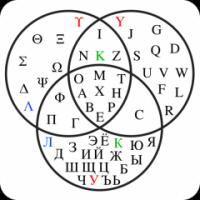Hozzászólások: 29
Nyelv: English
sudanglo (Profil megtekintése) 2013. április 18. 22:52:50
It sounds like an excessively literal translation from English, to my ear.Or French, Erinja.
If Google Translate is to be believed a construction of the form Ne X-u risko(j)n is to be found in most European languages. The question arises then as to what X should be in Esperanto if not preni.
Preni is incidentally totally logical in terms of the NPIV definition sin ŝarĝi per io materiala aŭ abstrakta.
Riski isn't like manĝi. Granted you can say ne manĝu (no object). But there is no support in the Tekstaro for an objectless or complementless usage of riski. The examples are ne riski Y-on or ne riski Z-i.
Don't take risks leaves open whether you are advised not to risk your life, health, injury, financial loss, whatever.
Chainy (Profil megtekintése) 2013. április 18. 23:41:38
1. Fratoj Grimm - Elektitaj Fabeloj, translated by Kabe
“Ho Dio,” li diris, “savu min, amiko; vi konas la ĉirkaŭaĵon, prenu mian porkon kaj lasu al mi vian anseron.”2. Patroj kaj filoj, translated by Kabe
“Mi iom riskas,” respondis la junulo, “sed mi ne volas esti kulpa pri via malfeliĉo.”
“Eŭgeno Vasiliĉ tro riskas”, kvazaŭ kun bedaŭro diris la patro Alekso, kaj karesis sian belan barbon.3. Kastelo de Prelongo, Vallienne
Plie li ekpuŝis mem la riglilon, murmurante:4. Monato, Gilbert LEDON
— Nu, mi riskas.
La homoj ne komprenas la diferencon inter la risko por gajni kaj la risko por ne perdi. La homo kiu riskas ekskluzive por gajni, en realo nur ludas sub mistika impulso de avido. La homo kiu riskas por ne perdi, ne pensas pri gajno sed pri racia akcepto de la riskoj kiuj koncernas la vivon.
RiotNrrd (Profil megtekintése) 2013. április 19. 1:22:15
Of course, one could always make it explicit. Ne risku vin. Don't risk yourself; i.e., don't behave in such a fashion that you put yourself at risk.
There are always alternatives, though. "Ne riskagu". "Estu senriske" (yeah, alright, that sounds more like well-wishing than warning, but I think it could work). Or even just "Atentu!" And so on.
I would not personally use "preni" in this context*. It sounds too much like an anglicism to me. Or, thinking of it a different way, it has a kind of semi-idiomatic feel to it, even though it does seem possible to make a case for the usage. Kind of like some of the "make" expressions in English and German (make up, make off with, make out, etc.); some of them are solidly idiomatic - the individual words bear no relation at all to what the combination means - but some you can kind of make contrived explanations for. Preni, in this instance, strikes me similarly. It's a more abstract wording for something that maybe should be more stated more concretely. Which is the level I would shoot for.
-------------------------------
* Although my philosophy is "Y'all can talk however you want", so don't let that stop you.

matrix (Profil megtekintése) 2013. április 19. 5:58:07
sudanglo:I was translating the Fire Safety notices for the British Congress (only 3 weeks to go now) and wanted to find a good way of saying Don't take risks.“Don’t take risks.” → “Singardu.” or “Atentu.” [Be careful.] in a non literal way.
noelekim (Profil megtekintése) 2013. április 19. 7:28:38
Don't take risks by tackling a fire - Estas danĝere klopodi estingi fajregon
Don't take risks! It's better to prevent a fire than tackle one - Ne estu troriskema! Estas preferinde preventi fajregon ol klopodi estingi gxin
sudanglo (Profil megtekintése) 2013. április 19. 8:45:50
So under those circumstances the use of riski without an object or complement poses no problem.
'You might not make your connection if you take the later train'. 'Mi riskos'.
Of course, that would be a general principle that you might use a transitive verb without object or complement when the context has already established what would be the object/complement.
Mi ne povas/devas/faras, for example, can make perfect sense in context. But without preceding topic establishing circumstances, it would be bizarre - as a bald statement out of the blue.
In the structure Don't take risks we have a linguistic device for comfortably leaving open the nature of the risk.
However Ne risku, I feel, doesn't quite come up to that. Without a preceding tem-estigo, it immediately raises the question ne risku what.
sudanglo (Profil megtekintése) 2013. április 19. 8:52:29
Leporino (Profil megtekintése) 2013. április 19. 9:24:32
Translated to Eo this would be: Ne risku danĝeron!
erinja (Profil megtekintése) 2013. április 19. 15:01:15
Even the English has a sort of understood object, doesn't it? We aren't talking about 'don't risk losing money', we are talking about risking your own personal safety by doing foolish things. "Ne risku vin" works well in that context.
sudanglo (Profil megtekintése) 2013. április 19. 21:51:51






